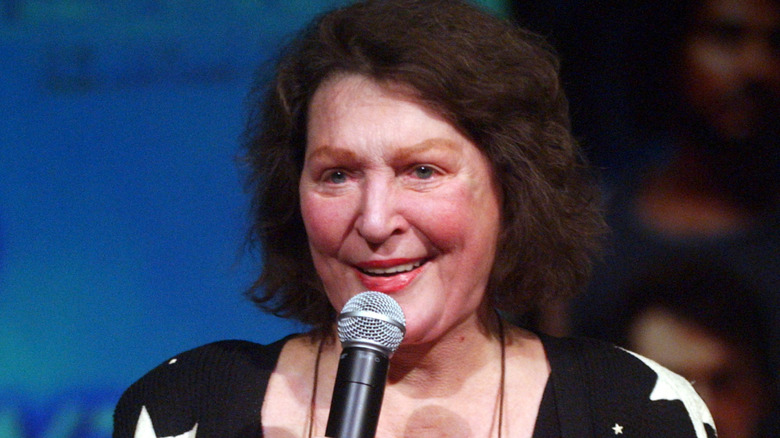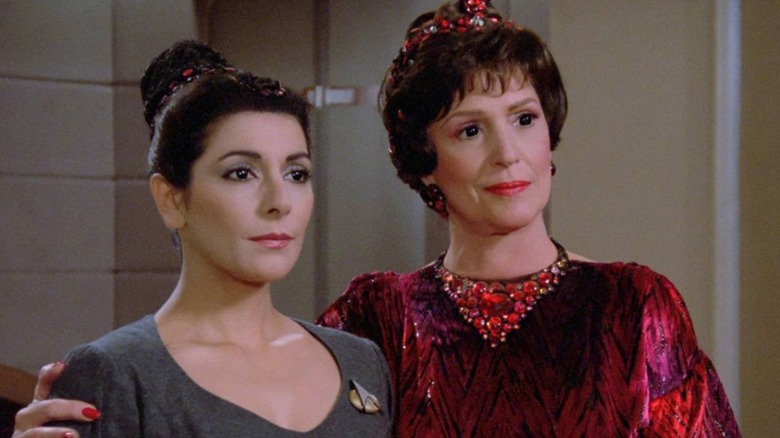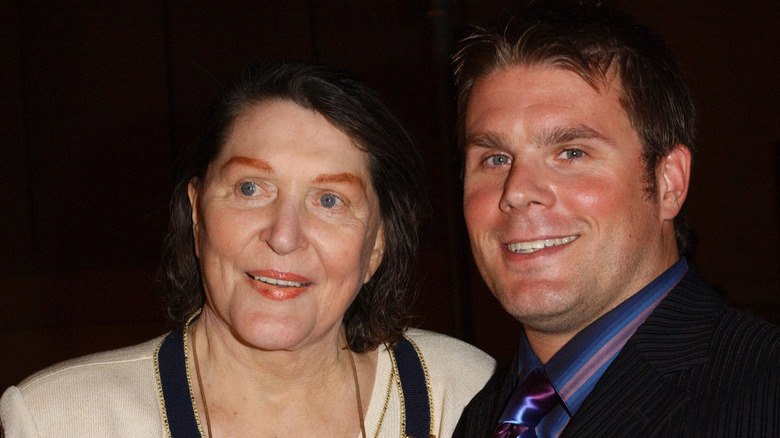Why Majel Barrett Was Known As 'The First Lady Of Star Trek'
If there's one person that's more important to the "Star Trek" universe than names like Kirk, Spock, Picard, and any other character that's graced the deck of an Enterprise ship, it's Gene Roddenberry, the creator of the nearly 60-year-old franchise. He molded a universe of brave heroes and explorers that sought out new life and new civilizations, changing science fiction forever in the process. It also left its mark on Majel Barrett, who would go on to marry Roddenberry and become what fans aptly dubbed "The First Lady of Star Trek."
Though she and Roddenberry met prior to the show's creation, Barrett found her place among the stars when she was cast on the original "Star Trek" series as Nurse Christine Chapel after portraying Number One in the show's pilot episode. While not as prominent as some other characters, she remained a staple of "Trek" lore, appearing in all three seasons of the original series as well as "Star Trek: The Animated Series."
The character of Chapel has regained greater prominence in the last few years as a key member of Captain Pike's (Anson Mount) team in "Star Trek: Strange New Worlds," though this time Jess Bush has brought the character to life. However, when it comes to the original actor behind the crew member, Barrett is one of the few original "Star Trek" legends who had multiple roles throughout the franchise's history.
Majel Barrett returned as the mother of Deanna Troi in Star Trek: The Next Generation
In 1979, Barrett reprised her role as Chapel (who had at this point become a doctor) in "Star Trek: The Motion Picture" and then again in "Star Trek IV: The Voyage Home" in 1986. A year later, Barrett returned to space in a brand-new role that would become just as beloved.
Appearing in nine episodes beginning with "Star Trek: The Next Generation" Season 1, Episode 11, she portrayed the legendary and incredibly flirtatious Lwaxana Troi, mother of Deanna Troi (Marina Sirtis). The character, who would also go on to make multiple appearances in "Star Trek: Deep Space Nine," was a far cry from her previous role, which was exactly why Barrett had so much fun playing her.
In an interview for the show's official magazine in 1988 (via StarTrek.com), Barrett said, "She's a much more fun character, and I can play her forever, because I'm at an age where that's totally believable. I would like to continue to do that." That being said, Barrett still held a special place in her heart for Chapel as well: "I could leave Chapel very easily. However, if somebody gave me the chance to do her again, of course I would." Lwaxana would be Barrett's last on-screen acting role in the "Star Trek" universe, but there was still an integral part of the franchise that she was responsible for since 1966. And through TV and movie magic, she was able to stick with it even after her passing in 2008.
Majel Barrett voiced the Starfleet computer
In addition to nursing injured members of the Enterprise's crew back to health, Majel Barrett was also the voice of the Starfleet computer, a role she held since the original "Star Trek" series. If life signs needed to be read or food had to be ordered, it was Barrett's voice that responded to the crew's request. It's a detail that, once you know it, can't be unheard if you watch a lot of "Star Trek."
Thanks to Roddenberry's foresight of where technology was headed, and with his wife's voice guiding the way, major companies that would make these fantasies a reality got in touch with her years down the line. Before her death in 2008, Rod Roddenberry (son of Majel and Gene) revealed the big names in the world of smart devices that tried to beam Barrett in to work on their products. "Those companies actually reached out to her. Apple, I believe, and I know Google did before she passed," he told CinemaBlend. "Everyone had the same idea, which is still a great idea, 'We should have Majel Roddenberry, the voice of the Star Trek computer, be the voice of all our automated machinery out there.'"
While that didn't come to pass, Barrett's voice maintained its position in "Star Trek" right up until J.J. Abrams big screen reboot of the franchise in 2009, proving that, just like her husband, the "First Lady of Star Trek" and her legacy would echo through space even after she was gone.


